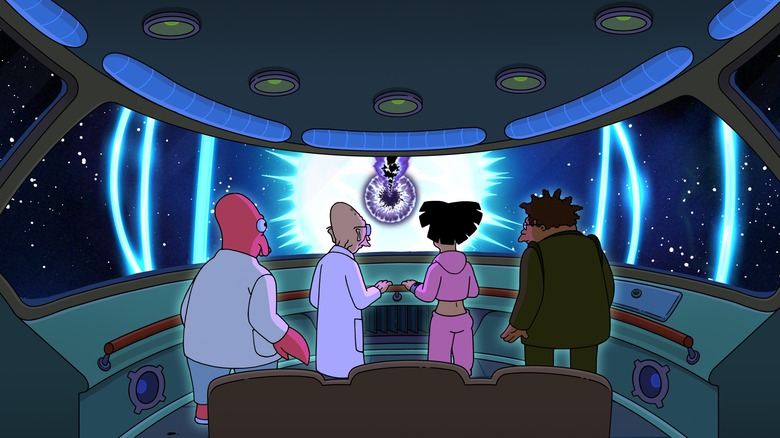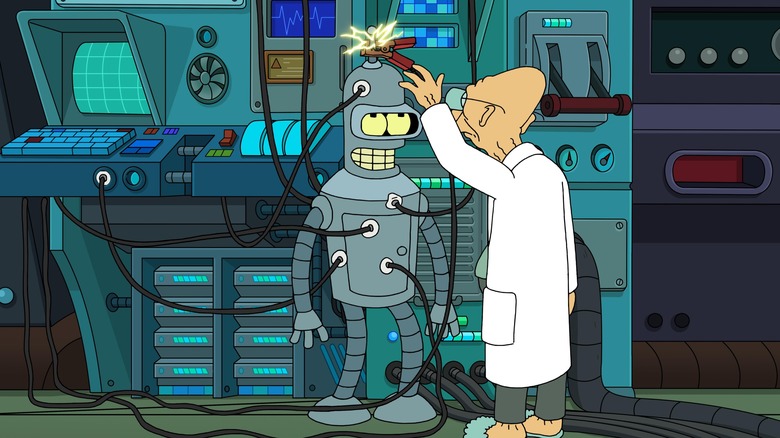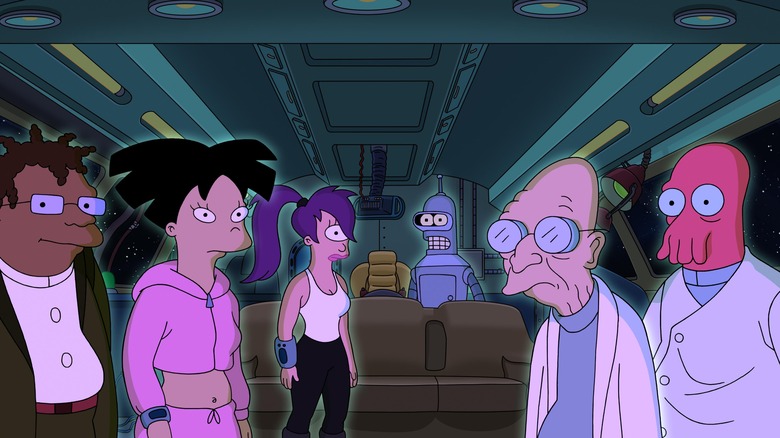Futurama Season 11 Asks The Toughest Question In Science
Spoilers for "Futurama" season 11, episode 10 follow.
When it comes to any sort of episodic or anthology-based science fiction series, there will almost always come a point where the characters start to wonder: Is their world even real? Although "The Matrix" is still probably the most famous story about a guy realizing he lives in a simulation, the concept had been driving philosophers crazy long before modern computers even existed.
In Plato's "Allegory of the Cave," written about 2400 years ago, the Greek philosopher described the life of a hypothetical group of people trapped inside a cave since birth, unaware that what they perceive as reality is just a series of elaborate shadows on the cave walls. In 1641, René Descartes wrote about how his senses weren't a reliable indicator that everything around him was truly real, that he couldn't prove with certainty that his whole world was not just an illusion created for him by some sort of evil demon. Whether the culprit was based in technology or the supernatural, people have always trembled before the possibility that reality might be some strange mirage.
So when the season 11 finale of "Futurama" began with Professor Farnsworth announcing he'd created a simulation of his own world, it wasn't too difficult to figure out exactly where the story was going. Almost immediately, Amy starts asking whether or not this could mean that their own world was part of a simulation. Farnsworth first disagrees, but quickly changes his mind and admits that, yeah, none of them are probably real either. After thinking it over for a few minutes, it seems clear to Farnsworth that what scientists in our world call quantum mechanics is probably just computer code programmed for us by someone in the actual real world. Well, that's a bummer.
So, now what?
Although the human members of the group are a bit miffed by the news that they probably aren't real, it's only really Bender that seems practically shaken by it. For Bender, the issue is not that the he might be fake; it's that he's definitely not real by the standards of his own universe. Even if his universe turned out to be legitimately real, Bender himself is burdened with the knowledge that he himself is still artificial intelligence. He was programmed to act this way, so he knows an argument can always be made that he's not a real person. (As to why any corporation would ever program one of their robots to act like Bender? That's a question for another episode.)
Bender's addition makes for a fun twist on the usual sci-fi premise, creating a fun back and forth between characters who think they might be fake and a character who knows he is. Much like how the concept of cookies in multiple "Black Mirror" episodes taught us that we should still empathize with fake people in simulations, the often-apathetic Bender is the only one who cares about the lives of those people in the lower simulations. After all, how could Bender possibly believe his own life is worth living if he doesn't also believe that these simulations' lives are still meaningful? It's what motivates him to travel down to the simulation and break the bad news to them, and it's also what possibly leads to another Bender (from the world of whoever's running the simulation one level above our main characters) to come down to their level as well.
I'm not real? Big whoop
Our main characters never dwell on the implication of Bender's body rebooting in the same way Simulation Bender's body rebooted, so the episode spares them from the realization that their world's a lie. As for the simulation one level down? They get to see their universe glitch as the simulator fails to capture the complexities of a collapsing magnetic star. But as Fry and Leela's final moments together make clear, the fact that they know they're not real shouldn't actually matter. Just as Descartes famously concluded, "I think, therefore I am," Fry had already declared that life being a simulation "makes no difference at all."
As Fry reasons, the fact would still remain that their creators are far beyond their comprehension, and there's nothing they could do about the situation, so they'd still have to approach life as they did before. Fry still loves Leela and wants to spend the rest of his time with her, regardless of whether they're actually just a program on someone's hard drive. This is the conclusion a lot of simulation narratives end up making, from Emily St. John Mandel's recent novel "Sea of Tranquility" to that "USS Callister" episode of "Black Mirror." Even the latest movie in the "Matrix" series focuses its happy ending less on helping humans escape the simulation, but on making that simulation better for everyone inside. Reality, many sci-fi stories seem to argue, is not as important as we might assume.
The episode's final moments center on Fry and Leela choosing to embrace in the aftermath of this confirmation that their life is technically a lie. They're not thrilled about the whole idea, but their love for one another still feels real to them, and that's what matters most.
"Futurama" season 11 is now streaming in its entirety on Hulu.


